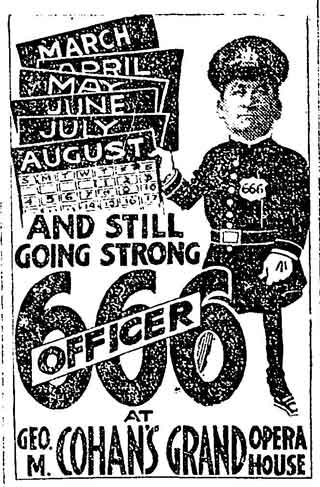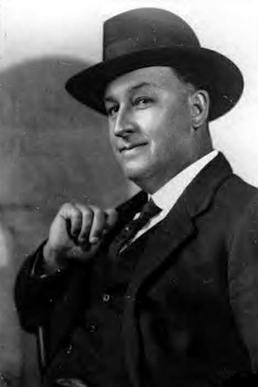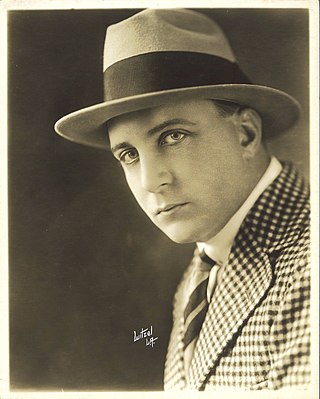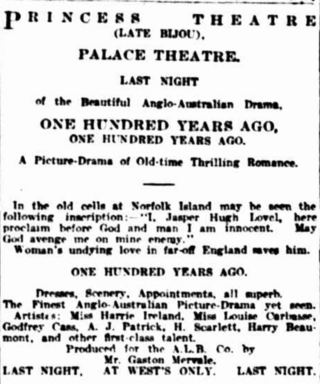Related Research Articles

Louise Lovely was an Australian film actress of Swiss-Italian descent. She is credited by film historians as being the first Australian actress to have a successful career in Hollywood, signing a contract with Universal Pictures in the United States in 1914. Lovely appeared in 50 American films and ten Australian films before retiring from acting in 1925.

Officer 666 is a 1916 silent film made in Australia, based on a successful Broadway comedy of 1912. The film was directed by Fred Niblo who would go on to direct The Mark of Zorro, The Three Musketeers, Blood and Sand and over forty more films.

Raymond Longford was a prolific Australian film director, writer, producer, and actor during the silent era. Longford was a major director of the silent film era of the Australian cinema. He formed a production team with Lottie Lyell. His contributions to Australian cinema with his ongoing collaborations with Lyell, including The Sentimental Bloke (1919) and The Blue Mountains Mystery (1921), prompted the Australian Film Institute's AFI Raymond Longford Award, inaugurated in 1968, to be named in his honour.

George Marlow was an Australian theatrical entrepreneur born in London of Jewish extraction, noted for bringing melodrama and pantomime to Sydney audiences in the early 1900s. His name has been frequently mis-spelled as "George Marlowe".

Arthur Shirley was an Australian actor, writer, producer, and director of theatre and film. He experienced some success as a film actor in Hollywood between 1914 and 1920.

Moonlite is a 1910 Australian bushranger film about Captain Moonlite, played by John Gavin, who also directed for producer H.A. Forsyth. It was also known as Captain Moonlite and is considered a lost film.
Spencer Cosens also known as Cosens Spencer or Charles Cozens Spencer, was a British-born Canadian film exhibitor and producer, a significant figure in the early years of the Australian film industry. His company Spencer's Pictures was an early backer of Raymond Longford before it was absorbed into the conglomerate which became known as "The Combine".

Captain Midnight, the Bush King is a 1911 Australian silent Western film about the fictitious bushranger Captain Midnight. It was the directorial debut of actor Alfred Rolfe. The film is based on the play of same name by W. J. Lincoln and Alfred Dampier. Captain Midnight, the Bush King is now considered lost.
The Life of Rufus Dawes is a 1911 Australian silent film based on Alfred Dampier's stage adaptation of the 1874 novel For the Term of His Natural Life produced by Charles Cozens Spencer.

Whose Was the Hand? is a 1912 Australian silent film directed by Alfred Rolfe. It is considered a lost film.

One Hundred Years Ago is a 1911 Australian silent film directed by Gaston Mervale. It features an early screen performance from Louise Lovely and is considered a lost film.
The Colleen Bawn is a 1911 Australian silent film directed by Gaston Mervale starring Louise Lovely. It is adapted from a popular melodrama by Dion Boucicault.
A Daughter of Australia is a 1912 Australian silent film directed by Gaston Mervale starring Louise Lovely, then known as Louise Carbasse. It was set in the early days of the Australian goldfields and is considered a lost film.
Conn, the Shaughraun is a 1912 Australian silent film directed by Gaston Mervale starring Louise Lovely based on a popular play by Dion Boucicault. It is considered a lost film.

The Wreck of the Dunbar or The Yeoman's Wedding is a 1912 Australian silent film directed by Gaston Mervale starring Louise Lovely. The plot concerns the shipwreck of the Dunbar, one of Australia's worst maritime disasters. It is considered a lost film.
Jewelled Nights is a 1925 Australian silent film directed by the film star Louise Lovely in collaboration with her husband Wilton Welch. Only part of the film survives today.

Dan Morgan is a 1911 Australian film from Charles Cozens Spencer about the bushranger Daniel Morgan. It was said to be starring "Alfred Rolfe and company". Rolfe directed three movies for Spencer, all starring himself and his wife Lily Dampier so there is a chance he may have directed this one and that it starred his wife. A prospectus for the Australian Photo Play Company said he directed it. It is considered a lost film.

The Life Story of John Lee, or the Man They Could Not Hang is a 1912 Australian silent film based on a stage play about the true life story of John Babbacombe Lee.
The Australian Life Biograph Company was a short lived Australian film production company in the silent era. It funded many of the early films of Gaston Mervale and Louise Lovely.
Wilton Welch was an Australian comic actor and dramatist, husband and collaborator of Louise Carbasse, best known as Louise Lovely.
References
- ↑ "Advertising". The Referee . Sydney. 22 May 1912. p. 16. Retrieved 14 September 2013– via National Library of Australia.
- ↑ The Ticket of Leave Man at silentera.com
- ↑ "LYRIC THEATRE". The Sydney Morning Herald . 5 May 1913. p. 4. Retrieved 25 January 2012– via National Library of Australia.
- ↑ "TOWN HALL". Albany Advertiser . WA. 28 June 1913. p. 3. Retrieved 25 January 2012– via National Library of Australia.
- ↑ Andrew Pike and Ross Cooper, Australian Film 1900–1977: A Guide to Feature Film Production, Melbourne: Oxford University Press, 1998, p35
- ↑ "AMUSEMENTS". The Barrier Miner . Broken Hill, NSW. 31 August 1915. p. 3. Retrieved 25 January 2012– via National Library of Australia.